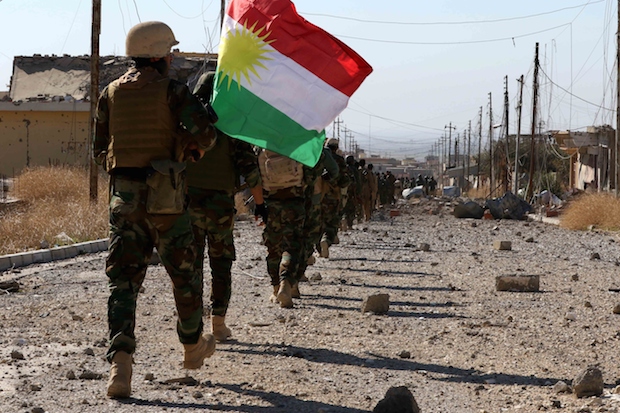In Kurdistan, we have had reason to be grateful for Western intervention. Last June, Daesh captured one third of Iraq overnight and then attacked us. What saved us was swift Western airstrikes, partly from British forces. Now we ask for your help again.
We have a border of 650 miles with Daesh. We have pushed them back and recently captured Sinjar – the scene of medieval rape, sexual enslavement and genocide against the Yezedis. Once again, Western airstrikes were vital. Our liberation of Sinjar cut the main supply road between Mosul and the Daesh ‘capital’ of Raqqa – but Daesh can use other roads. We cannot defeat them without international help.
We Kurds of Iraq long said we had no friends except the mountains. But 25 years of friendship with Britain and the West changed that. In 1991, Saddam Hussein’s gunships were driving Kurds to the mountains, where they froze to death; your no-fly zone saved many lives. Twelve years later, the overthrow of Saddam allowed a new Iraq to emerge. Kurdistan was recognized; we overcame enmity with Turkey, and started to produce long-neglected energy supplies. But since American forces left Iraq, Baghdad has returned to a centralized, sectarian mindset. This has marginalized the Sunni population – some of whom have then combined with Syrian Sunnis to form Daesh.
Most of Daesh’s territory is in Syria, which should be considered with Iraq as a single theatre. British airstrikes, already taking place in Iraq, would carefully target Daesh fighters, trucks and supplies in Syria. This is welcome, and no doubt our allies will do their utmost to avoid civilian casualties. But sooner or later, more will be needed: it will take ground troops to defeat Daesh. We know many British people are wary but we have to say, as your allies, that some British troops could be vital.
Our problems go beyond the military threat. The Baghdad government, reliant on support from the Shia majority, has marginalised us and delivered crippling cuts to our budget: civil servants and the Peshmerga have not been paid for months. Meanwhile, the Syrian war and the advance of Daesh have pushed nearly two million displaced people into the Kurdistan Region. The way out of the crisis must be through a political settlement in Iraq, and the federal, democratic and pluralist Iraqi constitution. Even if one day we opt for independence, which would have to be an amicable divorce, we need to work with Baghdad for the common good. In reaching such a settlement, as with military action, we ask for help from the West.
Military attacks are not the only way to confront Daesh. Their oil revenues and external funding should be severed. We must also challenge their ghastly pretension to represent Islam. Kurdistan could be a shining example of what a moderate Muslim state looks like: we are secular, seek to be democratic and are expanding women’s rights. We share your values, and we need your assistance on many fronts. It must be your decision, but British airstrikes in Syria would help us.
Karwan Jamal Tahir is Kurdistan Regional Government High Representtive to the UK.






Comments